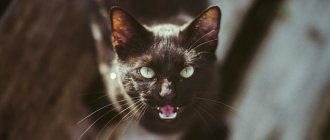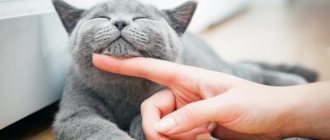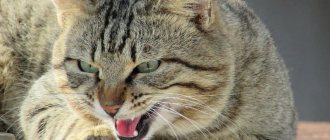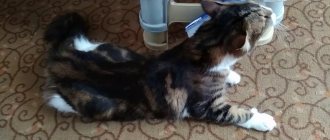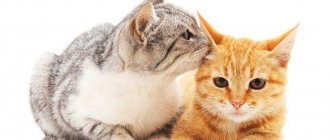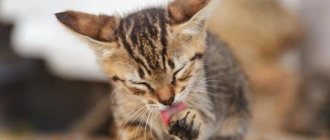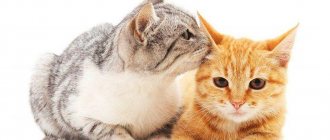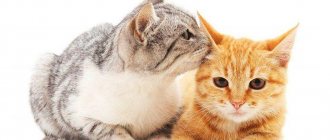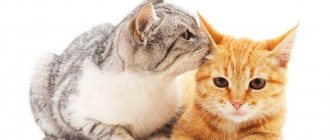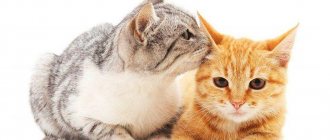Many cat owners find that their cat is always asking for food even if it is fed the right amount throughout the day, and there could be several reasons why they do this. This behavior, or rather a condition known as polyphagia, can be frustrating for the owner because, frankly, it's not a natural behavior when you think about cats in the wild: they hunt, eat, clean, then sleep and start all over again.
They don't constantly hunt for food, so why all the begging? In this article, we'll look at all the possible reasons why your cat is always begging for food, even when she's finished eating, and sometimes even when there's still food in her bowl.
Asks for food when there is food in his bowl
One of the reasons why a cat may beg for food when there is still food in their bowl could be because they feel that it is no longer fresh, this is due to the fact that in the wild they eat fresh prey, and, if your food sits in a bowl for a long time, he may simply find it not fresh now.
Having said that, try stirring him a little with your finger, shaking the bowl so he thinks there is more fresh food now. Moreover, if you remove the bowl after the cat has eaten, this may help, and then when she begs for food again, you can only offer her uneaten food if it is dry food.
© shutterstock
Another reason why a cat may beg for food even if its bowl is half full may be due to its whiskers. If you have a deep food bowl, when the cat gets down to a certain depth, his whiskers may start to touch the sides of the bowl or the food, causing the cat to stop eating. Additionally, a cat taking medication for a medical condition may develop polyphagia. It sounds stupid, but he may just be uncomfortable eating when his whiskers are touching something, to fix this, try giving him a shallow bowl but a larger diameter, sometimes something as trivial as this may work.
Why is it dangerous to overfeed kittens?
As soon as the baby is taken from the mother, as a rule, this happens no earlier than 2.5-3 months, the responsibility for feeding it falls entirely on its owners. Proper nutrition and a balanced diet are the most important factors in the full development of a pet. At the same time, you need to understand that overfeeding is just as dangerous for a growing body as underfeeding.
INTERESTING TO KNOW: Why you shouldn’t give kittens cow’s milk
The kitten's stomach is still very small and is not able to process large volumes of food, so it needs to be fed in small portions, but often. However, many owners believe that the more you feed your baby, the better for his growing body. This is a dangerous misconception!
A kitten that systematically overeats develops a large belly, which not only prevents it from moving, but can also paralyze the functioning of the digestive tract. A large and hard belly may also indicate that the baby has stool stagnation (constipation) due to overfeeding, which occurs due to a decrease in physical activity. Such kittens are very lethargic, move with difficulty and sleep a lot.
To normalize the digestion process, it is necessary to urgently adjust the diet: limit the number and volume of feedings, switch to high-quality special food for kittens, introduce a sufficient amount of microelements and vitamins into the diet - if preference is given to natural food, good food already contains nutrients in the quantity required for a growing organism.
And, of course, it is very important to provide the baby with sufficient physical activity.
Asks for food when there is no food in the bowl, but it has already been eaten
A cat asking for food if its food bowl is empty could simply be because it hasn't had enough, although this is probably unlikely so we need to look at other possibilities and it could be behavioral or even medical.
First of all, it's easy to forget that he's growing if he hasn't already, so you may want to just double-check the amount listed for your cat's weight and age because he might just be starving. Once you have ruled this out, make sure you space out his meals at regular intervals as some owners who work odd hours may feed their cat when it suits them, the problem is that this may not be suitable for your cat .
Sometimes there is an underlying reason why your cat is constantly asking for food, and one of those reasons may be inactivity. If your cat doesn't get much activity during the day, she may become a little lazy, leading to begging, which in turn can lead to obesity and other health problems. It is recommended to make meal times fun, try playing with him ten minutes before each meal, this may have the effect of hunting in the wild as they release a lot of energy when chasing and hunting prey and he may be less prone to begging after eating.
Feeding principles
Disorderly eating will not benefit the animal. Therefore, you should adhere to certain rules:
- You should not offer cats dog food that has a completely unsuitable composition for them. The result may be a deficiency of essential minerals and vitamins.
- Food from the table is possible only occasionally; it should serve as a supplement to the regular diet. Fluffies happily eat offal, fish, vegetables, and dairy products, but they should be given in strictly limited quantities.
- Pets should not be placed on an exclusively meat diet.
- Raw meat and fish, as well as unboiled fresh milk, should be prohibited. Their consumption will lead to the appearance of worms or an intestinal infection.
- High quality cat food contains all the necessary ingredients, there is no need for vitamin supplements.
- Food should be at room temperature. If your pet eats food from the refrigerator, it is poorly digested.
Important! Be sure to have a bowl of fresh water next to the food. Prepared food in bags has sufficient moisture, and pelleted food causes a constant need for water.
Health status
In most cases, cats that constantly beg for food have an underlying medical condition, and in many cases it may simply be a medical condition. One common condition that makes a cat seem hungry all the time is worms, and while none of us want to admit that our cat might have this condition, it is more common than you think, but it is treatable.
Worms can be acquired from a variety of places, especially if your cat likes to play outdoors or spend the night. However, your veterinarian can quickly determine if he has worms, and this is a relatively easy-to-treat and affordable process, usually in the form of oral medications.
© shutterstock
Feline diabetes may be another cause of increased appetite, scientifically known as diabetes mellitus, when the cat's body does not use insulin correctly or does not produce enough insulin. Diabetes can be identified, again by a veterinarian, through blood tests and a physical examination with laboratory tests, and can be treated.
Signs you may want to look out for as an owner may include excessive urination, excessive drinking of water, and constant begging, in which case you should make an appointment with your veterinarian as soon as possible. Moreover, you may find that even if your cat eats very well, she may be losing weight, which is another sign of diabetes.
Other health conditions that can lead to polyphagia can be acromegaly, which is an excess of growth hormone, usually resulting from a pituitary tumor, Cushing's syndrome, hyperthyroidism, inflammatory bowel disease, and even pregnancy in cats.
Almost all health conditions can be cured or managed thanks to advances in medicine, and your veterinarian can be your best friend in finding the cause of polyphagia in your cat. Your cat constantly asking for food may seem natural at first glance, but in reality there is always a reason for something unnatural, and it could be something as simple as a behavior you learned early on.
Other possible causes of constant hunger in cats
- Cold season. Increased calorie consumption to heat the body. The cat requires double portions.
- Advanced age of the individual. Older cats are characterized by reduced resistance (stability) of the body. Also, older individuals freeze more often and more often.
- The body's reaction to certain medications. The list of drugs that most often cause hunger includes anticonvulsants and hormonal drugs.
- The cat suffered stress and discomfort persisted for a long time. During stressful situations, the animal almost does not eat, and after eliminating the dangers, it begins to actively replenish lost energy reserves.
Mistake #8: The habit of looking for the cause of all problems in nutrition
- Dull coat, heavy shedding. Dull fur can be due to lack of care, old age, helminthic infestation, or other diseases of the internal organs. The cause of shedding may be dry indoor air, or it may be explained by physiological changes (seasonal shedding, baby shedding).
- Acne or “greasy tail” - in most cases, this problem is corrected by castration and replacing plastic bowls with ceramics, glass, porcelain, or metal.
- Bad breath and feces are diseases of the oral cavity and digestive organs. And it shouldn’t smell like roses there!
- Itching and scratching. The most common cause is flea dermatitis. We remember that if you don’t see fleas on an animal, this does not mean that they are not there. Regularly treat your animal for parasites!
- Flatulence and regurgitation of food are common eating disorders due to swallowing food too quickly along with air (aerophagia). Sometimes the reason is that the kibble size is too small. A prerequisite may also be the animal's infestation and other diseases of the gastrointestinal tract.
- Diarrhea and constipation often occur from banal overeating. Constipation is a companion of cats on a natural diet, where meat predominates. Diarrhea may indicate a viral infection (coronavirus, panleukopenia), worms and protozoa, a foreign body and other pathologies of the gastrointestinal tract.
- Diseases of the genitourinary system arise due to metabolic disorders, genetic predisposition and changes in urine pH. Sometimes problems of the genitourinary system occur due to obesity or stress (idiopathic cystitis). Nutrition is most often only an indirect cause.
- Kidney/liver disease is my favorite “on holistics the kidneys fall off.” The cause of chronic renal failure is most often old age or genetic predisposition, and not high-protein food.
Owner, remember: first find out the cause with the help of a veterinarian, and then change the diet if necessary.
Diabetes
In diabetes mellitus, nutrients are not absorbed in the body, which causes energy deficiency.
Despite the efforts of the owners and the good diet of the animal, nutrients cannot be absorbed into the body, since a lack of glucose provokes an energy deficit for this process. And glucose itself is absorbed only with insulin, which is not enough as a result of a failure of metabolic processes.
Symptoms
One of the symptoms of diabetes is constant thirst.
- With excessive appetite, the pet sharply loses weight, and the amount of urine output increases.
- Peripheral neuropathy manifests itself - the animal walks, leaning on the entire foot, the gait is uncertain, unsteady.
- The cat becomes weak, lethargic, and reluctant to make contact.
- The smell of acetone is felt from the oral cavity, the skin becomes thinner, the coat is disheveled, dull, a sickly appearance and a dull look.
Treatment
A properly selected diet is the key to successful treatment of a cat.
If diabetes is suspected, the owner can independently check the sugar level. To do this, you will need to conduct a test using special urine strips. It is also possible to use a veterinary glucose meter to check your blood sugar levels. The physiological indicator of sugar in the urine is its absence. In the blood - from 3.3 to 6 mmol/l.
